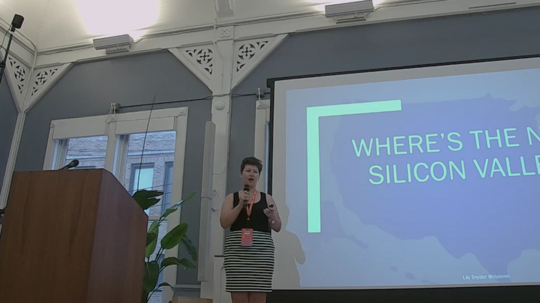
Editor’s Note: This story was written live on Techstars Startup Week Day 4 and published today as a quick retrospective. Check out our previous reports here.
Cincy’s tech and startup scene is booming, and it's also become a home to several virtual reality and augmented reality startups. AR/VR and might be known best in the video game world, but several companies are using it to impact business and health care.
On Oct. 11 at the “Tech Frontier Series: AR/VR The Immersed Customer Experience,” national and local talent spoke about the latest trends in the AR/VR space.
Lily Snyder, recognized as one of the top women in AR/VR, took to the stage first for the keynote. During her speech, she explained how she often worked with clients who were initially unsure what exactly VR or AR was.
In just two years since she entered the industry, Snyder said that times have changed. That's in part to Moore’s Law (which observes that the power of computing doubles every 18-24 months). For example, VR headsets and accompanying software continue to improve on a regular basis, such as the Oculus Go. Today, it can run without a PC and prices in at under $200 — and technology will become cheaper as content and hardware standardizes.
As knowledge of the tech and devices itself has grown, Snyder said that there are still some hesitancy for consumers to adopt AR/VR in their work.
“But opening up their mindset to using a new technology is also about the future about their business,” she said.
Technologists can get businesses excited about AR/VR by not only leaning into its cool factor, but also emphasizing its ability to help a company grow, reduce costs and increase productivity.
VECTRE co-founder Myra Ballentine and Jenny Yu of Gensuite followed Snyder, each explaining how their companies work and how the two organizations have collaborated.
Ballentine's startup launched in March and provides virtual reality trainings and opportunities for large companies to test their products in a virtual marketplace.
She argued that AR and VR will change the world, especially through its ability to enhance education and training.
“The goal of good learning is being able to understand and process information for a later time,” Ballentine explained, adding that “doing the real thing” or “simulating real experience” leads to a 90 percent learn rate. Where AR/VR enhances this learning is that it takes away the hazards and consequences of learning a task in real life.
Dr. Ryan Moore of Cincinnati Children’s Hospital (which is ranked No. 2 best children's hospital in the nation) was the next to present, explaining how it uses AR/VR to enhance its practice.
Moore, a pediatric cardiologist, explained how doctors were having trouble utilizing 3D heart models to plan out heart surgeries.
To fix the issue, he connected with the hospital's VR team. They then created a VR baby, which allowed doctors to practice in a virtual workspace.
“You don’t want to learn ... on the job after you’ve had a bad day,” Moore said.








